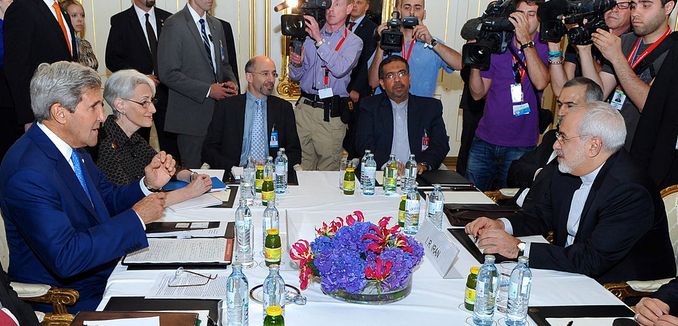The premise of the Obama administration’s approach to negotiations with Iran is flawed, according to an op-ed published Friday in The Washington Post. The op-ed was written by Eric Edelman, a former undersecretary of defense during the George W. Bush administration; Dennis Ross, a former senior adviser to President Barack Obama; and Ray Takeyh, a senior fellow at the Council for Foreign Relations.
While the authors acknowledge that economic sanctions have impacted Iran, they also note that sanctions haven’t forced Iran to cease being “a revolutionary state that rarely makes judicious economic decisions,” which fears “integration into the global economy.” But the authors point to a more basic mistake:
The fraudulent 2009 presidential election was a watershed event in Iran’s history, as it transformed the Islamic Republic from a government of factions into just another Middle Eastern dictatorship. The forces of reform were purged from the body politic, leaving behind only like-minded mullahs. While many in the West still view Iran as a country of quarrelling factions and competing personalities, the Iranians themselves talk of nezam — the system. This is not to suggest that there are no disagreements among key actors, but the system has forged a consensus on core issues such as repressing dissent and preserving the essential trajectory of the nuclear program.
Accordingly, the administration’s bet on President Hassan Rouhani—”a clerical apparatchik,” not a real reformer—was a mistake. The administration “sought to manipulate Iran’s factions at the precise moment when factionalism was no longer the defining aspect of Iranian politics.”
Edelman, Ross, and Takeyh prescribe a different approach to correct the mistaken policies of recent years which, in addition to new increased sanctions against Iran, proposes:
Iran must face pressure across many fronts, and the Obama administration should focus on mending fences at home while rehabilitating our battered alliances in the Middle East. It is important for Tehran to see that there are no divisions for it to exploit between the White House and Congress. The president would be wise to consult with Congress on the parameters of an acceptable deal and to secure a resolution authorizing him to use force in the event that Iran violates its obligations or seeks a breakout capacity.
A new strategy of pressure should also focus on isolating Iran in its neighborhood and undermining its clients. This will necessitate U.S. involvement in the region’s many crises. For both humanitarian and strategic reasons, the United States must be invested in the outcome of the Syrian civil war. A no-fly zone, at least in the north, could make a humanitarian, political and military difference in Syria — and would signal to Iran that the cost of backing dictator Bashar al-Assad will go up. Similarly, the Iraqi government must be pressured into limiting Iran’s influence. It is unlikely that Baghdad will move in that direction as long as our campaign against the Islamic State remains hesitant and we hint at possible collaboration with Iran there. The core of the U.S. alliance system in the Middle East remains our close partnership with Israel. The value of U.S. deterrence is not enhanced by perceptions of discord in that essential relationship.
Notably, while the op-ed includes a call for greater cooperation with Israel, it has been republished at the United Arab Emirates-based Gulfnews website.
Edelman, Ross, and Takeyh’s arguments echo those made recently by Michael Doran of the Hudson Institute, who called for strengthening the sanctions regime in Senate testimony; Amos Yadlin, Israel’s former head of military intelligence, who wrote that the United States must have a credible threat of force; and former Obama administration official Gary Samore, who called for closer cooperation between the administration and Congress over the Iranian nuclear issue.
[ Photo: U.S. Department of State / WikiCommons ]




